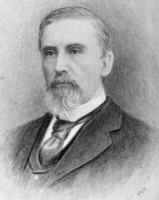
West Virginia’s fourth governor, John Jeremiah Jacob (December 9, 1829-November 24, 1893) was born in Hampshire County. He was the first governor born within the area that became West Virginia and the first Democratic governor of the state. His father, John J. Jacob, was a captain in the Revolutionary War, a Methodist minister, and sheriff of Hampshire County. After his father’s death in 1839, Jacob’s mother, Susan McDavitt Jacob, moved the family to Romney, where Jacob attended the Romney Classical Institute. In 1849, he attained a B.A. at Dickinson College in Carlisle, Pennsylvania. Returning to Romney to teach, he also began studying law.
Jacob married Jane Baird, of Washington, Pennsylvania, in 1853, and they were the parents of three children. In 1853, he was appointed professor of political economy at the University of Missouri, where he continued until 1860, resigning to pursue the study and practice of law in Columbia, Missouri. Jacob returned to Romney in the summer of 1865 and established a law partnership with Col. Robert White.
Jacob was elected to the 1869 session of the House of Delegates as a Democrat. He soon was nominated for governor and defeated Republican incumbent William E. Stevenson in the election of 1870. His two year term began March 4, 1871. Jacob came to the governorship as a conservative when circumstances, including economically difficult times and the adoption of a new constitution, prevented many of his proposals from being implemented.
A constitutional convention, called by popular referendum in 1871, met in 1872. The Democrats, who had won the governorship and gained a majority in both houses of the legislature in the 1870 election, controlled the convention and were responsible for the fundamentally different laws instituted by the new constitution. The new constitution removed restrictions on the political rights of West Virginians who had served the South during the Civil War. The new constitution changed the gubernatorial term from two years to four, and eliminated the right of a governor to succeed himself. However, Jacob’s first term ended before the new constitution and the one-term limit went into effect.
Although Jacob won his first term as a Democrat, in his second term he became the only governor to be elected as an independent. At the constitutional convention, a group of Democratic leaders decided to support wealthy industrialist Johnson Newlon Camden for governor. At the Democratic state convention a few weeks later, they were successful in nominating Camden, but were viewed as having acted with impropriety. Jacob’s supporters joined with the Republicans and encouraged Jacob to run against Camden as an independent. No Republican candidate was nominated. After a heated and bitter campaign, Jacob’s integrity and reputation for protecting the state’s interests were preferred to Camden’s wealth and connections to big business. Jacob was elected for a second term which began March 4, 1873.
The 1872–73 legislature faced the task of modifying laws to conform to the newly adopted constitution, which became effective January 1, 1873. The governor and the legislature were in frequent conflict over the limits of his appointing powers. Jacob’s administration was further disrupted by the 1875 removal of the capital from Charleston to Wheeling, just five years after the seat of government had been moved from Wheeling to Charleston. In addition to the expenses incurred in financially difficult times, the move disrupted and disturbed government operations.
At the conclusion of his second gubernatorial term on March 4, 1877, Jacob decided to remain in Wheeling and practice law. He was elected to represent Ohio County in the House of Delegates for the 1879 legislative session. In 1881, he was appointed Ohio County circuit judge to fill a vacancy. Jacob was then elected to the same office a year later and served as judge until 1888, when he returned to his law practice.
Jacob died in Wheeling, two weeks short of his 64th birthday, and was buried in a family cemetery at Romney.
This Article was written by Harold Malcolm Forbes
Last Revised on November 30, 2023
Related Articles
Sources
Morgan, John G. West Virginia Governors, 1863-1980. Charleston: Charleston Newspapers, 1980.
Encyclopaedia of Contemporary Biography of West Virginia. New York: Atlantic Pub. & Engraving, 1894.
West Virginia's Fourth Governor. West Virginia Review, (Apr. 1945).
Cite This Article
Forbes, Harold Malcolm "John Jeremiah Jacob." e-WV: The West Virginia Encyclopedia. 30 November 2023. Web. 03 May 2024.



Comments?
There aren't any comments for this article yet.
Click here to read and contribute to the discussion →